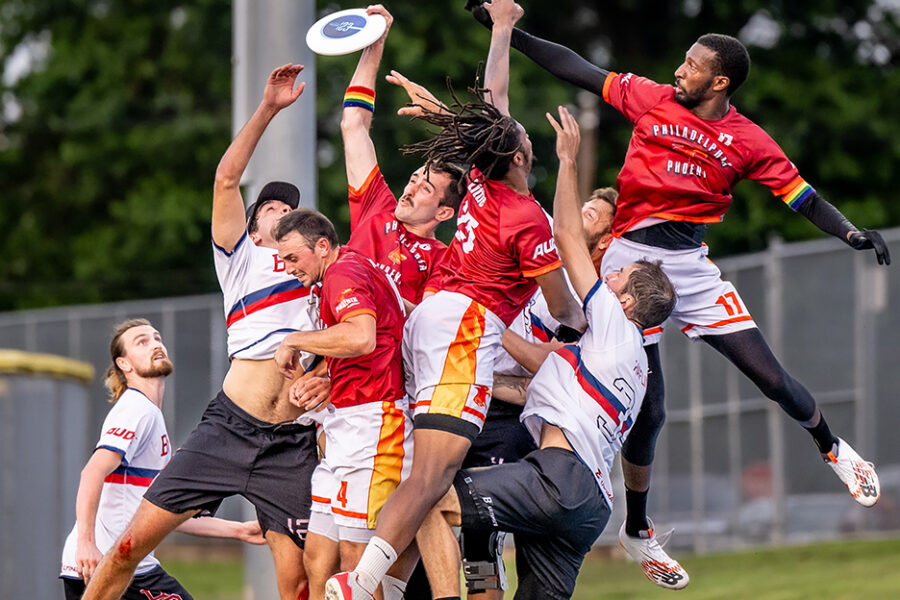
Philly’s professional ultimate Frisbee team has found a new home as its 2024 season gets ready to take off. Hey, did someone say Dollar Dog Night?
We’ve all been there… at the beach, the park or a summer picnic. Someone pulls out a frisbee. Yes, that molded plastic disc. Despite its apparent simplicity, it’s not so easy to throw it exactly where you want or even smoothly pluck it out of the air and make a clean catch. You’ve got to take into account the wind, have the right flick of the wrist and maybe you’ll be able to precisely toss it to your partner.
But the pros who will line up each week from May through July for a 12-game season with the Philadelphia Phoenix of the Ultimate Frisbee Association (formerly the American Ultimate Disc League), make the impossible look simple. With speed, athleticism, sick leaping ability and players who are constantly in motion, you might just fall in love with the game too if you check it out. The Phoenix, under the majority ownership of Dr. Christina Lee Chung and her husband Dr. Jeff George, will play five of their six home games on the campus of Neumann University in Aston, PA. And if you can’t get out to Delco for a game, all league matches will be streamed live on watchUFA.tv. And Phoenix games will be rebroadcast the Wednesday after they’re played at 8 p.m., on NBC Sports Philadelphia Plus. The team’s season finale—the Commonwealth Cup Game against Pittsburgh—will air live on NBC Sports Philadelphia on July 20, at 3 p.m.
One of the team’s standout players, 27-year-old “Big Game” James Pollard, is an athletic freak. At 6-foot-5 and 183 pounds, he’s a former tennis player at Jefferson University from where he graduated in 2018 with a degree in mechanical engineering. He runs a 4.75 second 40-yard dash, can sling the disc at least as far as the length of the ultimate field (80 yards) and has mad hops with a standing vertical leap of 30 inches. He not only helps the team on the field but also off, spreading the word about the game at camps and clinics the Phoenix run in various schools and communities in Philly and the surrounding suburbs.
The sport—now specifically called ultimate—continues to grow. It has been recognized by the International Olympic Committee though it will not be part of either the 2024 or 2028 Summer Olympics. The sport has deep roots in New Jersey where the first known sanctioned game was played in 1968 amongst students at Columbia High School in Maplewood. Two years later, the first interscholastic game pitted Columbia against Millburn High. And in 1972, Rutgers and Princeton held the first formal intercollegiate game, much like they did with football 103 years prior.
Ultimate combines a lot of concepts and rules from football, basketball and soccer (and you can see some rugby in there too). A point (or goal) is scored when one team catches the disc in the end zone the opponent is defending. The field is basically laid out in the same manner as a football field, but the yard lines are not part of the game. The playing surface is roughly 80 yards long and the end zones are 20 apiece. A team possesses the disc for as long as they can hold onto it. Once a player catches the disc they cannot run with it, must establish a pivot foot and pass the disc within seven seconds. The team must complete passes along the way to scoring a goal. Last year in the UFA, the Phoenix averaged 19 goals per game and allowed just over 18 goals per game, so with 37 trips to the end zone in each contest, there is a ton of action and a ton of scoring.
![]()
According to team minority investor and Phoenix Fun Czar, Johnny “Goodtimes” Nottingham, when you check out this sport in person, you’ll be hooked.
“I’ve been doing this a few years now and still, at every game, there’s at least three or four instances where I’ve just been like, ‘Holy s**t! How’d he do that?’ ” Nottingham said. “Somebody will fire the disc like 70 yards and another guy will track it down on a dead sprint and catch it while diving out of bounds. And once people see stuff like that, they’ll buy into the excitement just as much as I have.”
Nottingham, whom Chung has charged with creating a memorable game day experience for fans through marketing and promotional duties, is also an investor in the Philly-centric Shibe Vintage Sports and hosts Quizzo at several establishments in the region as well as corporate and private events. He and the rest of the Phoenix team, from top to bottom, are thoroughly invested in creating a great fan experience. And that will include a “Dollar Dog Night” at the team’s second home game on May 11.
“The Phillies got rid of Dollar Dog Night, so we’re doing it,” says Pollard, who scored 41 goals to rank 11th in the league and second on the team in 2023. “We’re going to get some extra fans out for that one, I’m sure. And it’s against Boston so we have to pack the stands.”
“If you want to be a fan of ours, we don’t care about anything else,” Nottingham says. “We’re thrilled to have you aboard. So, if you show up at a game, we are just so psyched to have you there and once people see that, it’s just sort of like, ‘Oh wow, when I come here, I’m getting a little more special treatment than I would at a much larger sporting event.’ That’s what we’re trying to build. We’re not just trying to raise that awareness but once we get people to show up, we want to have that wow factor because that ultimately will determine the level of success we can reach.”
Chung, 48, who has been the managing partner, President and CEO of the Phoenix since 2018—she’s one of only two women to be a majority owner of a Philadelphia sports franchise along with the legendary Billie Jean King of the Philadelphia Freedoms in World Team Tennis—has a clear vision and goals she wants to reach with this team. And that’s despite the fact that she and her husband—Chung specializes in dermatology while George specializes in emergency medicine—did not have traditional business backgrounds but come from the healthcare sector.
“I wanted to build a sports business and sports enterprise that was going to compete, that’s going to be around,” Chung said. “I wanted to turn the franchise around. We’ve done that. We increased gross revenue by 788% from 2019 to 2023. We have developed a big youth program because I think that development is super important. Every year it’s expanding. We have eight different programs within our youth program. We have after-school programs, school vacation camps, summer camps, advanced programs, an intramural league, clinics and we do school assemblies. Every year different townships contact us to run summer camps at their locations, so we started it and were very Main Line-centric. We have expanded to Limerick, Phoenixville, Lower Merion, Southampton and more. We’ve done a really good job reaching the youth.”
“Without having a big business background, you can still see the different arms of the business and see how you can organize it and improve it,” George added. “We were starting from scratch. It’s like buying a house that needs to be renovated and doing it your own way. That was very attractive. It’s like a bare-bones project we could really do it our own way.”
George, 51, played the sport while at Penn State—he still plays actually—and introduced it to his wife in 2003 shortly after they met at Drexel’s College of Medicine and five years before they were married.
“I fell in love with the sport. It was new and exciting to me. I grew up playing soccer. I’m a sports fanatic… I love almost all sports. Ultimate encompasses a lot of the things I love about sports in general. I love seeing athletes showing off their speed and verticality. I love team sports and I love how ultimate is really the ultimate team sport.”
Pollard is one of those impressive athletes that makes watching this game so enticing. But aside from his on-the-field heroics—he was voted the league’s most-improved player in 2022—he also plays a big part in spreading the word about his team and the sport. He’s heavily involved in outreach, specifically the camps and clinics the Phoenix put on.
“I think it comes from just being into coaching,” said Pollard, who serves as an assistant coach for the University of Pennsylvania’s men’s club ultimate team. “It starts with my dad and what he does. He’s a leader in his organization and the people there call him coach. Plus, [there are] my personal coaches through tennis. I’ve always seen the value of having a good coach. I figured when I stopped playing, I’d get into coaching. I did a little bit [with tennis] while I was in high school and we did some in college, coaching in clinics. I enjoy coaching and I enjoy giving back to the community.”
Pollard, who grew up in Virginia but has made Philly his home since coming to town for college, is excited about where the Phoenix are going as well as where the sport of Ultimate is headed in the region.
“We had a couple of players last year who actually came to some of our camps back in the early days. It’s cool to see that return on investment and that we have been building up players. In (2018) my first season, we had a handful of really young guys but there were four or five of us who were just graduating from college. Now that group is mostly starters on the team. We really grew the base of what we had and just progressed with young talent to take over the team eventually.”
And now with a new home field, some creative marketing, strong leadership and an exciting, fast-paced product on the field, the Philadelphia Phoenix are ready to continue to grow in 2024 and beyond.
For more on the Philadelphia Phoenix such as their 2024 roster, complete kids’ summer camp and clinic schedule, youth leagues, and ticket info visit: www.watchufa.com/phoenix

